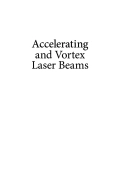The exact solutions of Maxwell’s equations or other equations of optics – the Helmholtz equation, he paraxial propagation equation of the Schrödinger type – have always attracted the attention of researchers. These solutions describe electromagnetic coherent light fields and laser beams, which are widely used in practice and whose properties can be described in detail analytically. Such well-known light fields that have an exact analytical description include: plane wave, spherical wave, aussian, and Bessel beams [1]. Some time ago, new light beams that had an accurate analytical description were discovered: Hermite–Gauss and–Laguerre Gauss mode beams [2], Hermite–Laguerre–Gauss beams [3], Mathieu [4]beams, [6], accelerated Airy beams [7], Pearcey self-focussing beams [8], and others. Light fields can be divided into two classes having orbital angular momentum (OAM) [9] and not having it. Beams with OAM are called vortex or singular. The vortex laser beams [10] have such distinctive features: a helical or spiral phase, wavefront dislocations, isolated points of zero intensity. The vortex laser beams have recently become widespread, they are used in sounding the atmosphere in the presence of turbulence [11], in wireless communication systems [12], to condense information transmission channels through fibers [13], in astronomy [14], quantum computer science [15] and micromanipulations [16]. The authors have previously written about vortex laser beams [10], but over the past several years, new vortex beams have appeared: asymmetric Bessel and Laguerre–Gauss beams, Hermite–Gauss vortex beams, Lommel modes, Pearcey half-beams, vector vortex Hankel beams and others. This book is devoted to their consideration.
